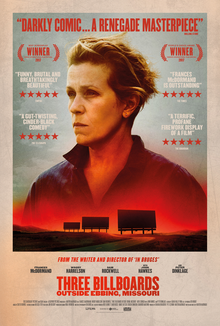
When my wife asked me what this film is about, I described it as a Coen brothers film that isn’t actually by the Coen brothers. This isn’t quite true as director Martin McDonagh is British and his visual style is different but between having Frances McDormand as the lead, it being set in a small American town that is named in the film’s title and its dark comedic drama tone, you have to agree that there is at least a superficial resemblance.
Mildred Hayes who lives in Ebbing, Missouri rents three billboards on the edge of the town. She uses them to excoriate the town’s police chief Bill Willoughby for failing to solve the rape and murder of her daughter some months ago. Willoughby however is well-liked by the townsfolk and is dying of cancer so the billboards upset many people. Furthermore, the case is unsolved not due to malice or negligence but simply because the police have no leads. When Willoughby chooses to commit suicide after his cancer worsens, most people blame it on Mildred. The police chief’s somewhat dim-witted but loyal deputy Jason Dixon is so angry and upset that he beats up the young advertising executive who rented the billboards to Mildred. Despite all this, she insists on keeping the billboards, perhaps seeing them as her only hope of getting justice for her daughter, and so is enraged when she discovers that someone has set them on fire.
The story’s premise is brilliant as a way to tear a small town apart, so kudos to McDonagh who also wrote the screenplay. I especially like that the character of Mildred is in no way your usual heroine. Tortured by her own helplessness, her obsession with justice has long since grown past what is reasonable and healthy. The execution of the film however is not quite authentically American, what with Willoughby’s wife having an Australian accent and the presence of Peter Dinklage playing a town local. These might deliberate touches to not seem like the director is a poseur and assert familiarity where none exists but it does seem that the film would have been better if it had been set in a cultural milieu that the director is more in touch. The cinematography is competent but there’s no real visual flair either. This can’t be said to be a beautiful film.
The first half of the film appears promising but it started tripping red flags for me in the second half. The revelation that Mildred had an argument with her daughter when she saw her for the last time is so heavy-handed that it’s cringey. When I saw that they were going for a heel-face turn arc for Dixon, I began to be unpleasantly reminded of the whole Crash debacle. Thankfully the film is savvy enough not to go quite that far, but it served as a caution that is no Coen brothers film. They would never be so blunt. Other commentators have also noted that both Mildred and Dixon commit pretty awful crimes but basically get away with them, as if the community has forgiven them due to knowing how much grief they have already suffered. That’s a level of protagonist immunity that sits uncomfortably with many people, myself included.
Overall I like the setup but I don’t much like how it unfurls from its promising beginnings at all. It still counts as being decently good but is burdened by too many flaws to rank among the year’s best.